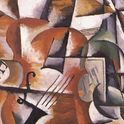“Do you have an ice cream?” my wife asked the guy in the buffet car on the Eurostar in French, waving her can of beer in a friendly way. After a moment of mild confusion, he smiled and handed her a plastic beaker. My wife’s very slight Geordie accent—and assumption that “glass” in French is the same as the English word—had led to her unexpected question.
A weekend in Paris (chief finding: if you get the chance to have lunch at Les Enfants Rouges this is a chance you should seize with both gourmandising mitts) has been a rebuke not just to her, but my, schoolchild French. How odd it is that even as you hear how faltering and tone-deaf you sound, you are powerless to do better—implying that your grasp of the cadences of a second language long outlives your grasp of its grammar and vocabulary.
You can hear the badness of your bad French, and the rightness of a native speaker’s use of the language—but you still can’t for the life of you remember that it’s idiomatic to say “treize heures” rather than “une heure de l’après-midi.” And as you fudge a gender—given that no vocal contortion can find a confident middle-ground between “un” and “une,” still less “de la” and “du”—it screeches in your own ears.
But much better to have a go, I think, and try to tune your ear, than to lapse into the Anglophone habits sent up by the late Miles Kington in his Let’s Parler Franglais! series—that of resigning yourself to speaking a tone-deaf pidgin of English vocabulary and sort-of-French grammar, smothered in an ’Allo ’Allo style cod-Froggy accent.
That’s not to say that everything about French is exemplary. It is, after all, governed by that heroically quixotic institution, the Académie française, which since 1635 has been battling against ghastly English loan-words such as “hashtag,” “cool” and “computer,” the last being specially piquant, as the French would say, since “computer” is originally a French word anyway. A great virtue of English is its porousness to influence—and it benefits from good-faith exposure to other tongues.
The experience of trying to resurrect, for instance, your French is further complicated if your under-used language bank contains more than one foreign tongue. I learned Russian to just-about-conversational standard long, long ago. Just about conversational to the extent that, in Moscow, I was mistaken for a Czech—which may or may not have been a compliment to my accent; I suspect not. But it’s as if one has a single second-language slot in the brain. I’m forever saying “privet!” to French people or “s’il vous plaît” in response to a Russian “spasibo.”
And yet, amid all this, there’s a moment of pure delight when you hit the note—a short run of syllables that you know, like a struck tuning fork, is just right; or a long-forgotten vocabulary item that appears in your mental inventory as if from nowhere.
I remember, for instance, walking down a wide street in St Petersburg about 10 years after I’d last visited Russia, and looking at a Whiskas ad (ads for western cat food brands hadn’t been features on my previous, early 1990s, trips). “ ” I had thought, marvelling: “With vegetables.”
What I mean to get at by all this is that the experience of speaking a second language—however falteringly, and with whatever clumsy and unintended results—is a mental pleasure to compare with a mouthful of the magnificent lievre (not what it sounds like) or baba au rhum (what it sounds like) you are to find on the formule déjeuner at Les Enfants Rouges. You find parts of your brain that had lain unused for years. You tune your ear to a whole new set of cadences.
And, yes, you get to eat an ice cream with your beer if that’s what you want. Merde alors, you’re on holiday after all.

A French Supermarket in Tahiti. Photo: Wikimedia Commons
Why even being bad at a second language is pleasurable
Try it, and you find parts of your brain that had lain unused for years
January 23, 2018











